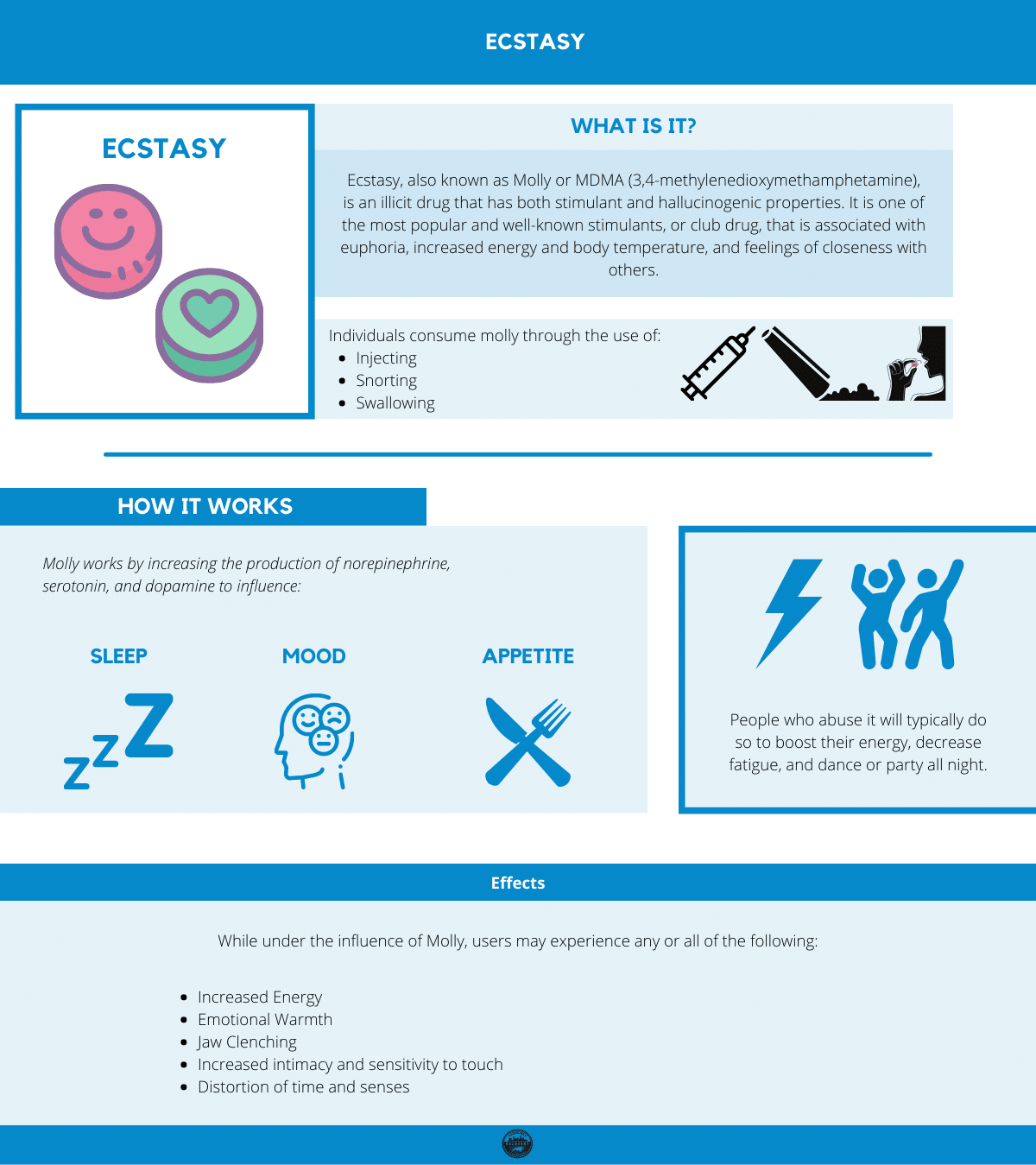How Long Does Ecstasy Stay in Your System?

Medically Verified: 2/1/24
Medical Reviewer
Chief Editor

All of the information on this page has been reviewed and verified by a certified addiction professional.
Ecstasy, also known as Molly or MDMA (3,4-methylenedioxymethamphetamine), is an illicit drug that has both stimulant and hallucinogenic properties. It is one of the most popular and well-known stimulants, or club drug, that is associated with euphoria, increased energy and body temperature, and feelings of closeness with others. As a drug that is usually abused recreationally and on a non-regular basis, many frequent users wonder how long ecstasy stays in your system.
MDMA is a Schedule I controlled substance, meaning it has no recognized medicinal use and a high-risk potential for abuse and addiction.[1] The drug is manufactured in clandestine laboratories where it is packaged into capsules, tablets, and powders with varying strengths, additional ingredients, and cutting agents. Depending on the potency of the dose you take and several other factors, MDMA can be detected in the body anywhere between one to 90 days.

How Long the Effects of Ecstasy (MDMA) Last
The majority of people who use ecstasy take it orally where it is absorbed in the gastrointestinal system. The effects should set in within about 30 minutes after a person takes it and levels of MDMA peak in the system between 1-3 hours after ingestion. When someone takes MDMA, the chemical directly affects the production and reuptake of dopamine, serotonin, and norepinephrine – three neurotransmitters responsible for mood, emotions, decision making, and thought processes.[2]
In order to understand how long the effects of ecstasy last and how long it stays in your system, you must understand the half-life of MDMA. Half-lives refer to how long it takes the body to metabolize a substance and reduce the concentration of that substance in the bloodstream by 50%. After approximately 4 half-lives, substances are thought to be eliminated from the system.
The half-life of MDMA ranges from six to nine hours depending on the specific individual.[3] As such, it can take between 1.5-2 days for the drug to be fully eliminated from a person’s system. That being said, even though the effects of a drug wear off and leave the system, certain types of drug tests can detect drug metabolites for several weeks or months after using the drug.
Factors that Influence How Long Ecstasy Stays in Your System
There are several different factors that dictate how long ecstasy stays in a person’s system and how long different types of drug tests can detect MDMA. These include:
- The frequency at which a person uses the drug and how long they have been using it on a regular basis can affect how long it stays in the system. Someone who took ecstasy some time will be able to pass a drug test sooner than someone who takes ecstasy every day.
- How much of the drug was taken at a time can determine how long it stays in your system. Someone who takes a higher dose will need more time to metabolize and process the substance than someone who takes a small dose.
- A person’s age, weight, and gender all affect the rate at which MDMA is metabolized. Individuals with higher body weight and those of older age will take longer to process MDMA than young and healthy individuals. At the same time, men tend to metabolize substances faster than women.
- Using Ecstasy with other substances such as alcohol can slow down the processing of MDMA in the body, increasing the length of time it takes to eliminate ecstasy from the system.
- The method of administration used can also affect how long ecstasy stays in your system. For example, someone who injects or snorts MDMA allows the drug to enter the bloodstream faster than someone who swallows it, so it will be eliminated from their system faster, as well.
How Long Ecstasy Stays in Your Urine, Blood, Saliva, and Hair Follicle
Drug tests are used to screen for metabolites in a person’s system to determine whether or not they have recently used a drug. Different types of drug tests have different detection windows, so the detection time for each drug test varies.
MDMA is not one of the five drugs that are usually screened for on most standard five-panel drug tests, however, it will test positive for amphetamine. If a person fails a drug test for amphetamine, a confirmation test can be run to test specifically for MDMA.
Depending on the type of drug test used, ecstasy is detected in your system for various lengths of time.
Urine Tests
Urine tests are perhaps the most common type of drug test. When doing a urinalysis, you will be asked to pee in a cup and a dipstick will be used to detect drug metabolites. Ecstasy can be detected in your urine for 2-4 days after your last dose.
Blood Tests

Blood tests are rarely used because they are invasive compared to other types of drug tests and can only detect drugs for short periods of time. As such, ecstasy can be detected in your blood for 1-2 days after it is taken.
Saliva Tests

Saliva tests are also rarely used because they can only detect substances for short periods of time after a person uses a drug. Ecstasy can be detected in saliva anywhere between 2 hours and 10 hours after your last dose.
Hair Follicle Tests

Hair testing is a nightmare for someone who is worried about passing a drug screen because hair follicles maintain traces of drugs for a fairly long time. MDMA can be detected in your hair follicle for several months after you stop taking the drug.
Find Help for Ecstasy Addiction Today
If you’re worried about passing a drug test or are obsessing over how long a drug stays in your system, you may want to take a deeper look into your substance use habits because you might be addicted. Fortunately, ecstasy addiction is easy to overcome with the help of a comprehensive addiction treatment program. Get started by speaking with one of our dedicated treatment specialists today.
References:

